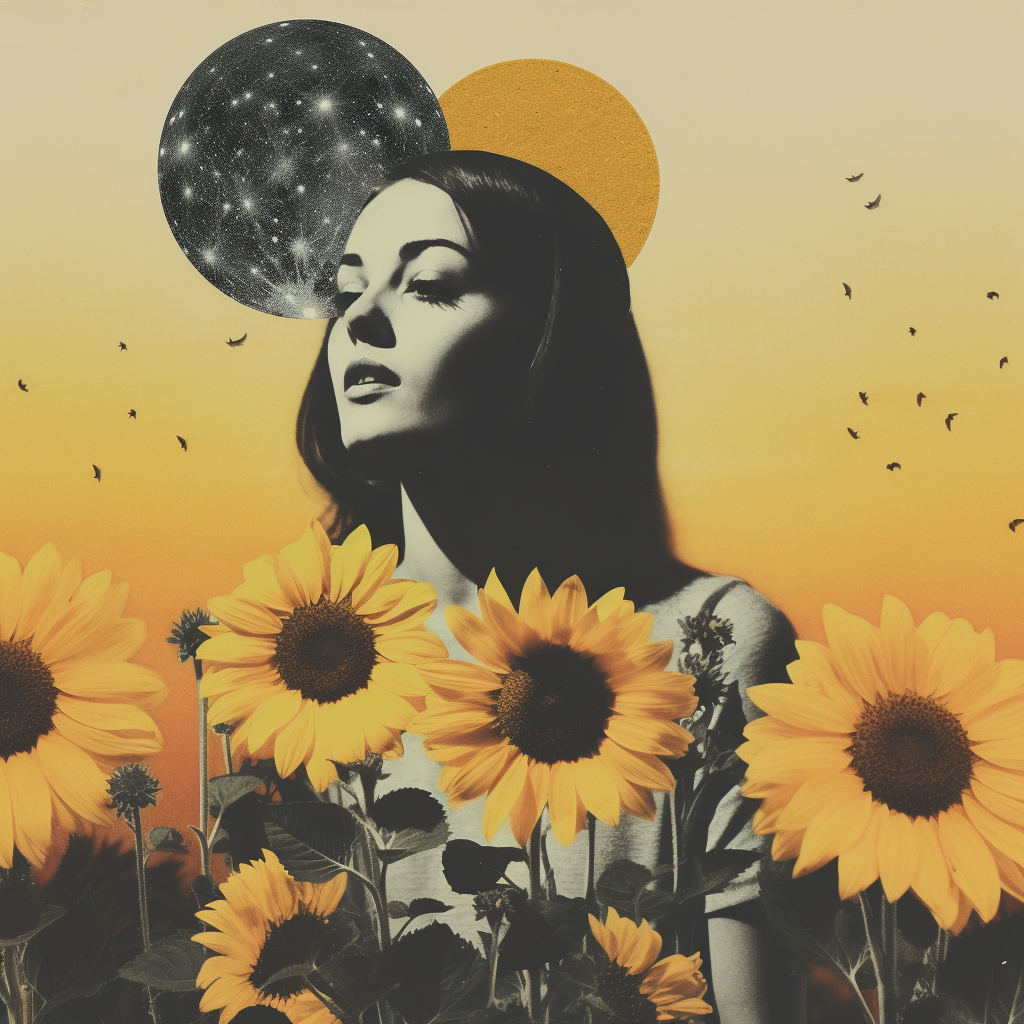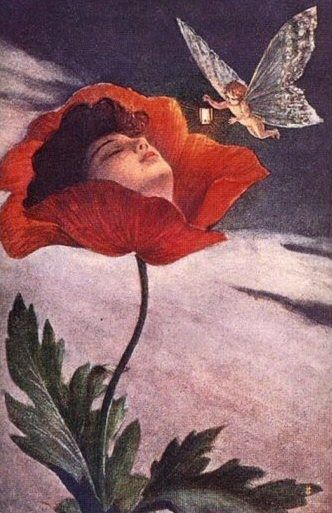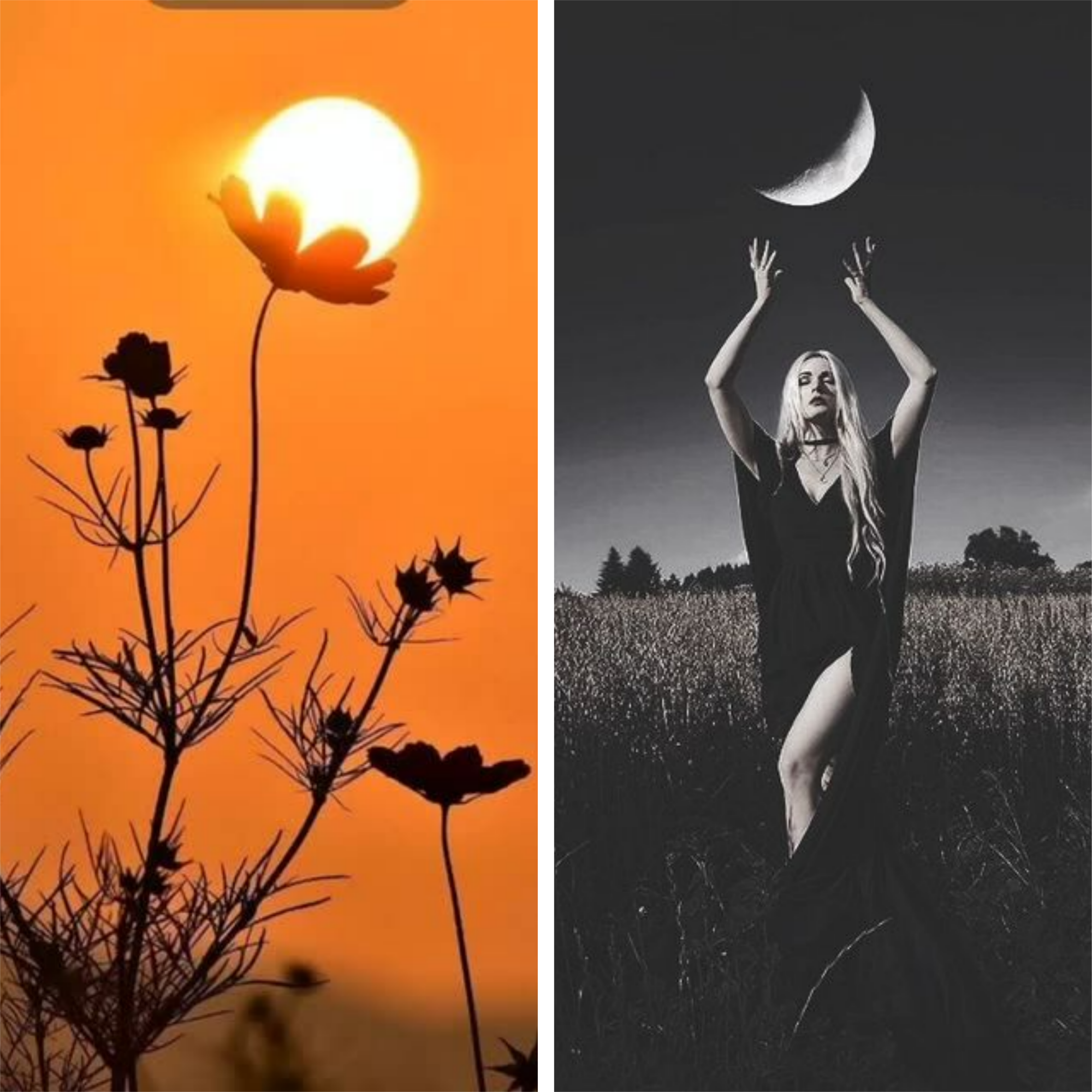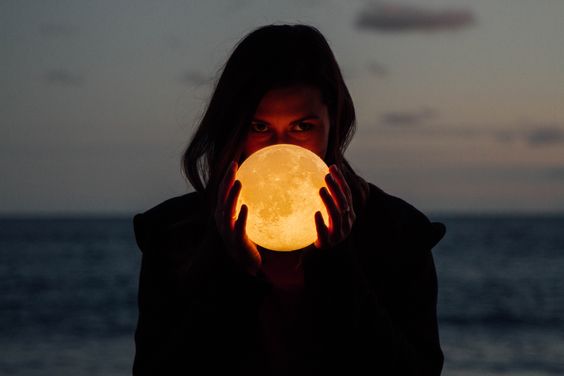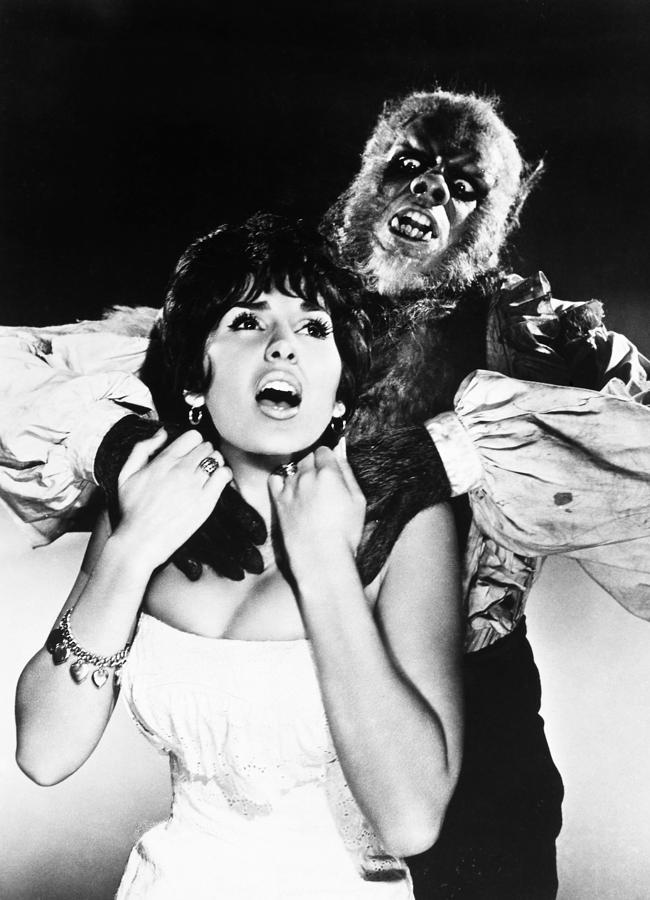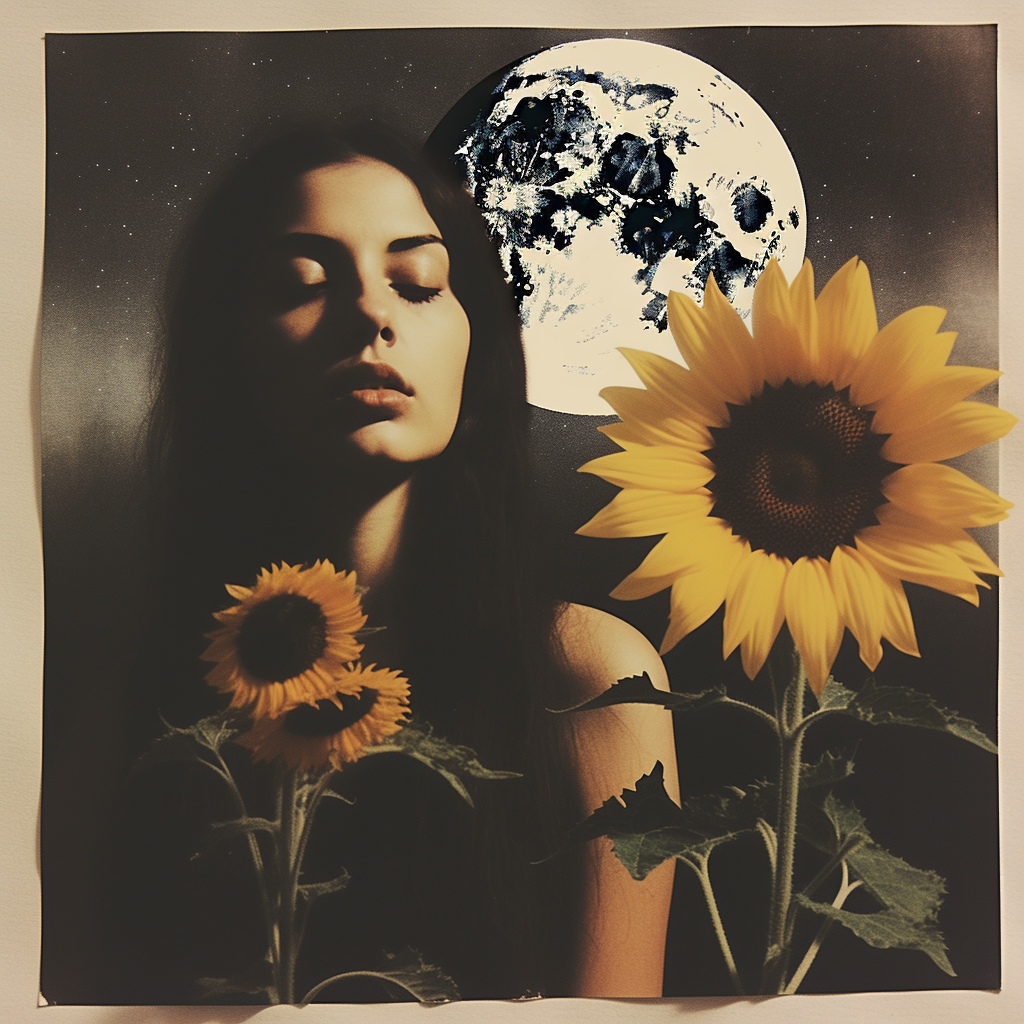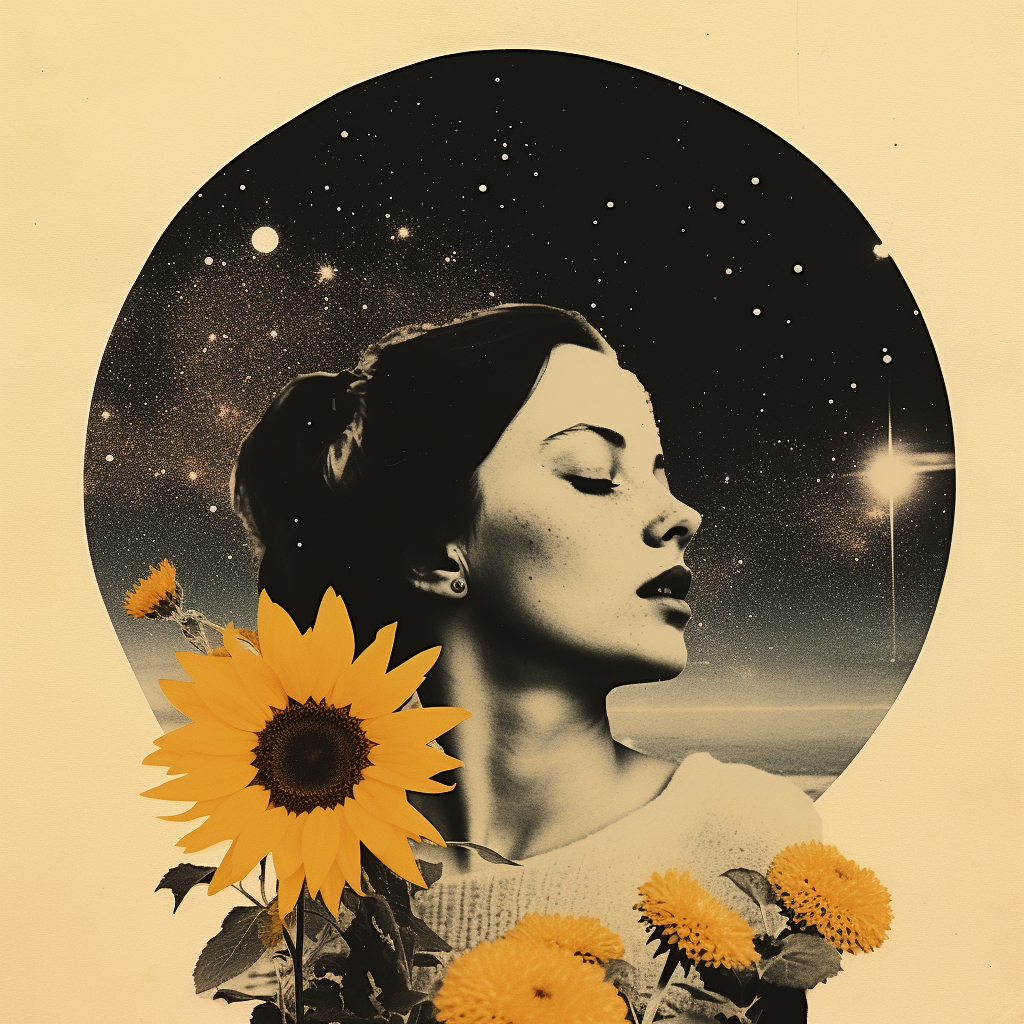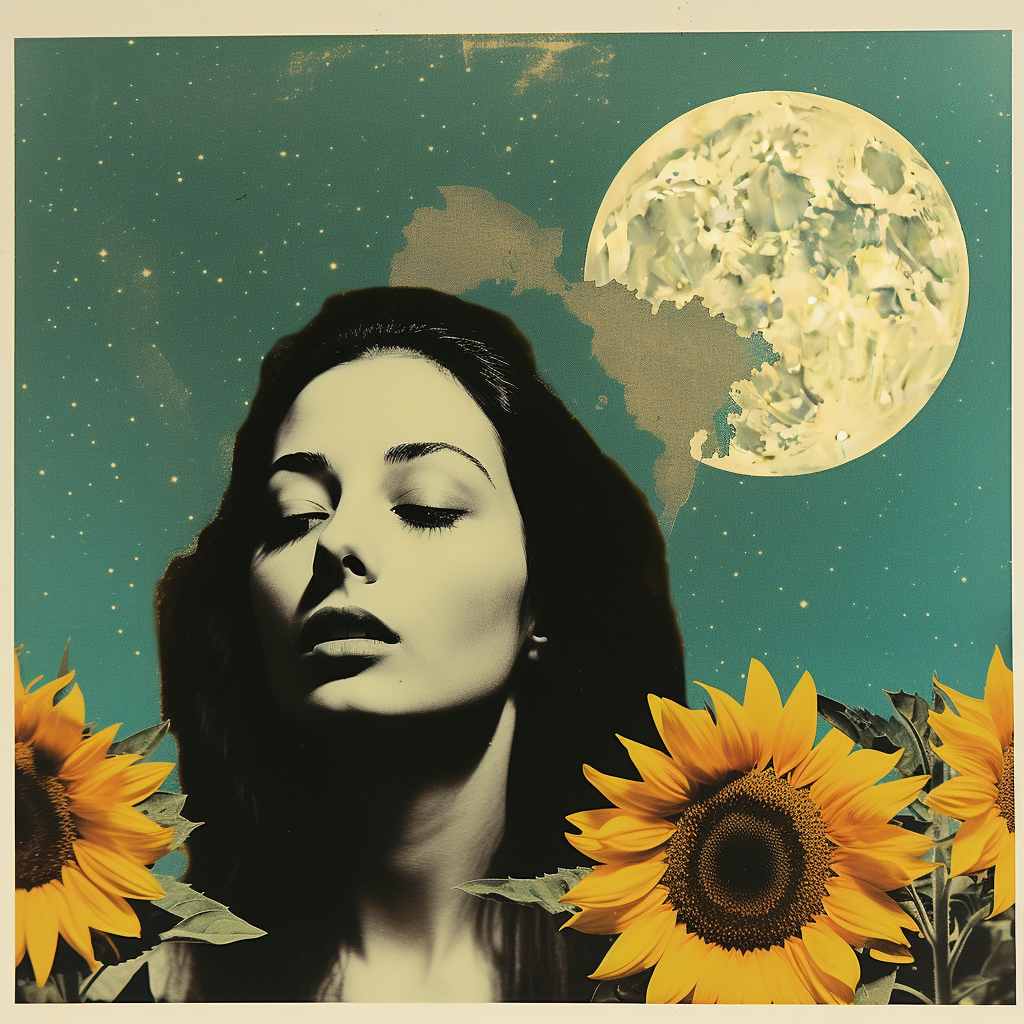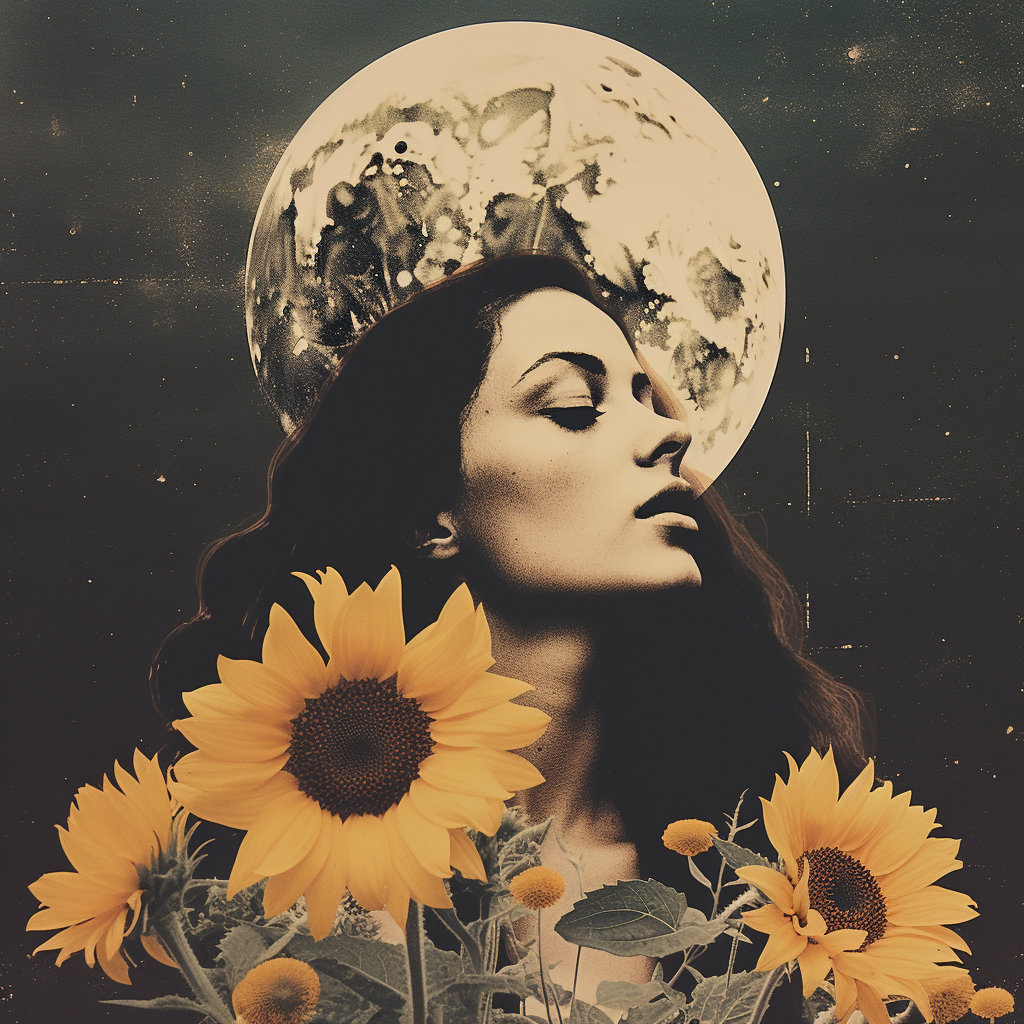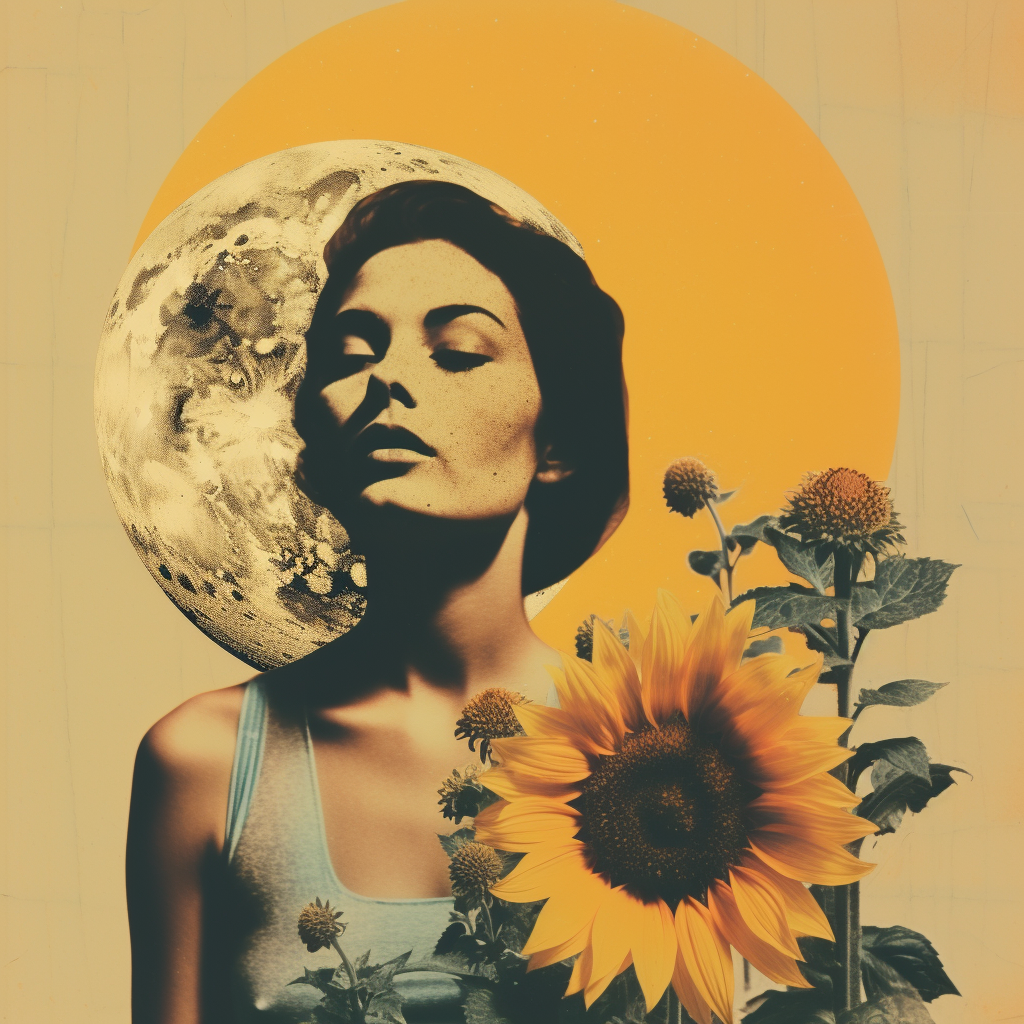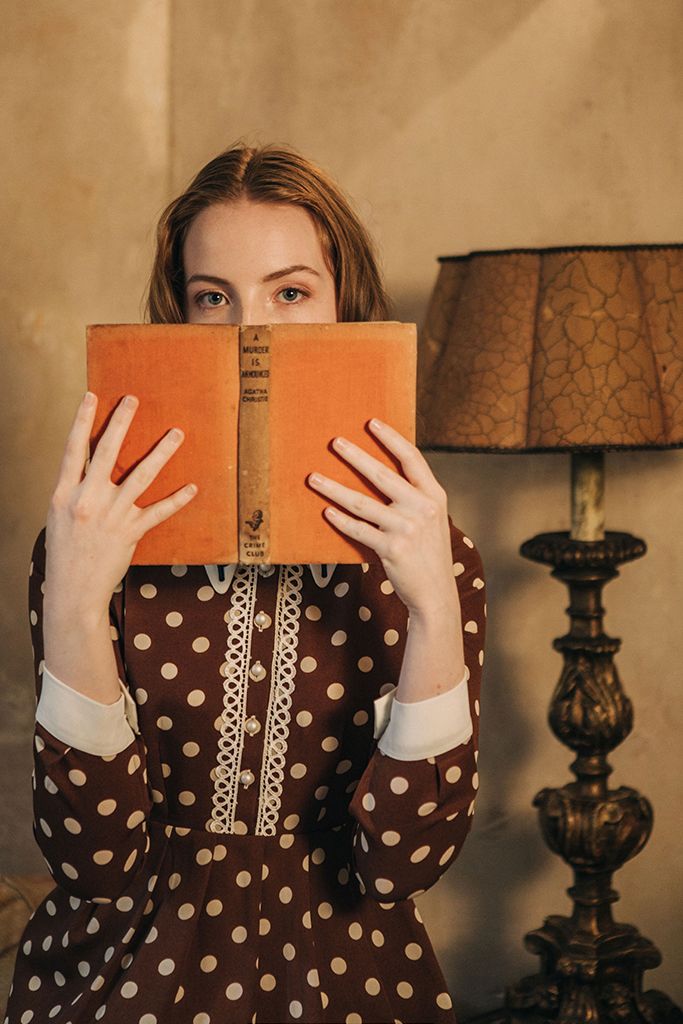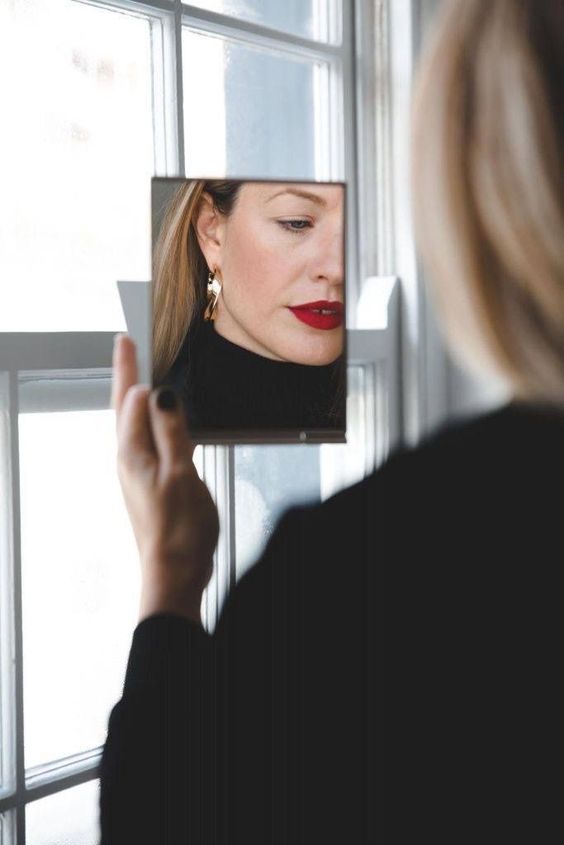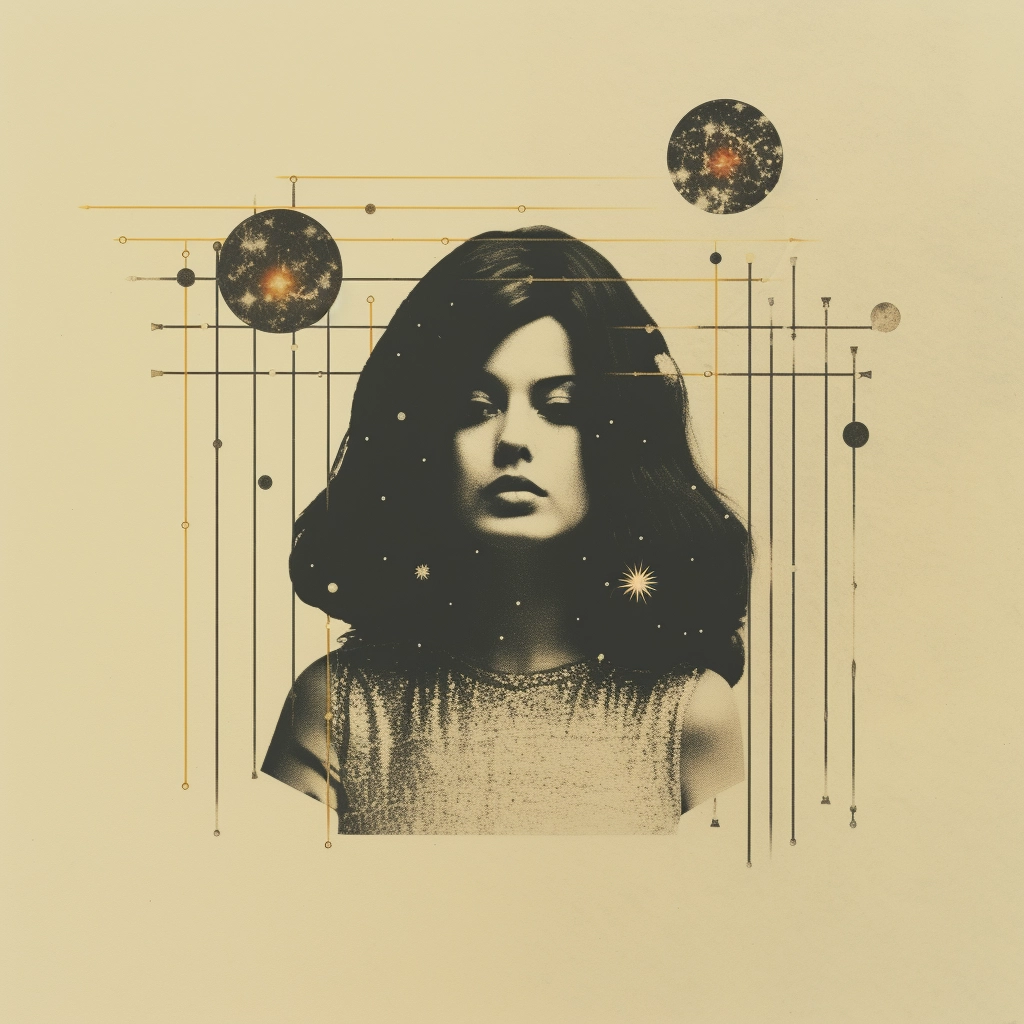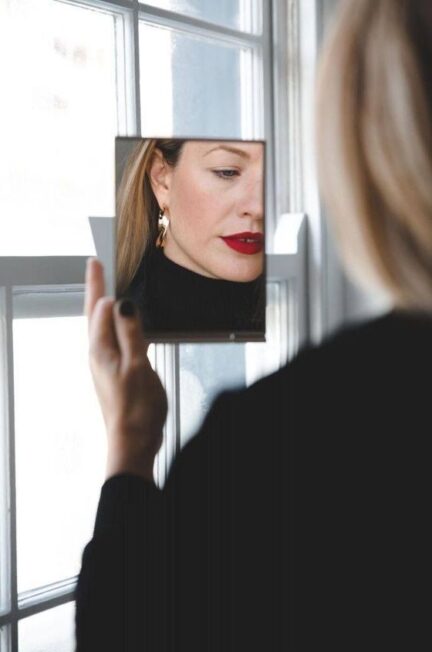 The Sun opposite Moon aspect in astrology highlights an interesting back-and-forth between who we are on the outside and what we feel on the inside, between our identity and our emotions. It showcases an internal struggle and how that plays out in our interactions with others. This aspect represents a deep divide within us, where the bright, logical side of the Sun clashes with the Moon’s instinctive, emotional side. It’s like an internal battle between head and heart. This opposition often manifests in an individual’s life through a pronounced struggle with identity. This struggle is not just superficial but touches the core of one’s being, bringing into question not just who they are but how they reconcile the myriad aspects of their personality that seem at odds with each other. The Sun, representing our ego, identity, and conscious will, is constantly seeking expression, illumination, and validation. Conversely, the Moon reflects our hidden emotional landscape, our instinctual reactions, and the sum of our internalized experiences and memories.
The Sun opposite Moon aspect in astrology highlights an interesting back-and-forth between who we are on the outside and what we feel on the inside, between our identity and our emotions. It showcases an internal struggle and how that plays out in our interactions with others. This aspect represents a deep divide within us, where the bright, logical side of the Sun clashes with the Moon’s instinctive, emotional side. It’s like an internal battle between head and heart. This opposition often manifests in an individual’s life through a pronounced struggle with identity. This struggle is not just superficial but touches the core of one’s being, bringing into question not just who they are but how they reconcile the myriad aspects of their personality that seem at odds with each other. The Sun, representing our ego, identity, and conscious will, is constantly seeking expression, illumination, and validation. Conversely, the Moon reflects our hidden emotional landscape, our instinctual reactions, and the sum of our internalized experiences and memories.
For those with this aspect, it can feel like the past doesn’t just inform their present but actively fights against it. Emotional baggage and instinctual habits from the past can act as a hindrance to their goals, ambitions, and efforts to define who they are. This might show up as feeling torn between the need for security and the desire for growth.
People with this Sun opposite Moon aspect in their chart often wrestle with their sense of self. It’s a deep-rooted struggle that questions not just their identity, but how they reconcile the different, conflicting parts of themselves.
The Sun, symbolizing our ego, identity, and conscious intentions, seeks to shine, be seen, and be affirmed. The Moon represents our hidden emotional world, our gut reactions, and the collection of our past experiences and memories.
This also brings up the idea of psychological splitting. Individuals might experience a sense of living double lives: one mirroring their deeper emotional identity, and another influenced by their aspirations and desires. This division can induce feelings of disconnection, both internally and in their interactions with others.
Sun Opposite Moon & Projection
In relationships, the Sun opposite Moon aspect often plays out through projection. The qualities, desires, or fears that an individual is not fully conscious of (or comfortable with) in themselves are projected onto others. This leads to a situation where one part of the personality is identified with, while the other part is projected. This can cause conflicts and misunderstandings, as they might find themselves in roles that don’t really fit who they truly are. However, these relationships mirror back the hidden aspects of their psyche, inviting them to integrate these fragmented parts of themselves.
The Sun when it opposes the Moon in the chart requires a conscious effort to bridge the gap between the conscious self and the emotional undercurrents that shape our reactions and relationships. This involves acknowledging and working through the emotional residues from the past, understanding their impact on our present identity and aspirations. Through this process, the opposition between the Sun and Moon can transform from a source of internal and relational conflict into a powerful catalyst for holistic self-understanding and growth.
The Opposition Aspect
Oppositions in astrology often represent a dynamic tension between two opposing forces within an individual’s psyche. When we talk about the Sun opposite Moon aspect, we’re delving into the battle between our conscious self (Sun) and our deep emotional patterns (Moon). This opposition sheds light on the internal struggle between expressing our uniqueness and meeting emotional needs like security, belonging, and family bonds.
This opposition brings to light an internal struggle between expressing one’s individuality and fulfilling emotional needs related to security, belonging, and familial ties.
The Sun, as the central luminary in astrology, symbolizes the ego, identity, and conscious awareness. When one identifies strongly with their Sun, they are inclined towards asserting their individuality, pursuing personal goals, and maintaining a sense of autonomy and uniqueness. This drive is essential for personal growth and self-actualization, as it fosters the development of one’s identity separate from external influences, such as family or societal expectations.
However, the Moon, as the opposing force in this dynamic, represents the emotional and instinctual realm, reflecting our deepest needs for security, comfort, and emotional fulfillment. It symbolizes the subconscious patterns, ingrained habits, and emotional responses inherited from our upbringing and early experiences. The Moon’s influence pulls us towards seeking emotional connections, nurturing relationships, and establishing a sense of belonging and stability, often rooted in familial ties and the familiarity of home.
The tension arises when these two opposing forces clash, creating inner conflicts between pursuing individual aspirations and fulfilling emotional needs. We might feel torn between going after our dreams and meeting family expectations, or between asserting our individuality and prioritizing emotional connections. This internal struggle can lead to feelings of confusion, ambivalence, or even a sense of being pulled in different directions.
However, despite the inherent tension, oppositions offer an opportunity for growth and integration. Individuals can work towards finding a balance between the Sun and Moon energies within themselves. This involves recognizing the importance of both individual expression and emotional fulfillment, integrating these seemingly conflicting aspects of the self into a harmonious whole.
For some individuals, a strong connection to their past or family heritage may shape their identity and influence their decision-making process. They may feel a deep sense of loyalty, duty, or attachment to their roots, which can sometimes conflict with their aspirations for individual growth and autonomy. In such cases, the pull of familial ties and tradition may create tension with the desire to carve out one’s path and assert independence. Similarly, personal needs and instincts can often clash with conscious goals and aspirations, leading to a sense of internal discord. Despite aiming for specific outcomes or pursuing certain ambitions, individuals may find themselves instinctively drawn towards behaviors or patterns that seem contradictory to their conscious intentions. This internal tug-of-war can leave them feeling torn between conflicting impulses, unsure of which direction to follow.
Astrologers often emphasize the importance of recognizing projections in relationships, where individuals may unconsciously project either their Sun or Moon traits onto others. This projection can lead to misunderstandings, conflicts, or idealizations in relationships, as individuals may project their own unmet needs or desires onto their partners or loved ones.
Sun vs. Moon: In astrology, the Sun represents our conscious desires and the Moon represents our hidden emotions. We might project these aspects onto others, seeing someone as incredibly confident (Sun) or deeply emotional (Moon). But in ourselves, we can integrate both sides. We can be strong and ambitious (Sun) while also being sensitive and compassionate (Moon).
Our inner world and external expectations might seem like opposing forces, just like fire and air, or earth and water. But here’s the beauty: these opposing elements can actually achieve a harmonious balance.
Fire, with its passionate energy, can be fueled by Air’s ideas and communication. Imagine a fire that burns brighter with a steady flow of oxygen (Air). Similarly, Earth’s grounding stability can be guided by Water’s intuition. Think of a plant (Earth) thriving with the right amount of water (intuition) to nourish its growth.
The Full Moon Phase
The Full Moon phase in astrology marks the peak of tension between the Sun and Moon opposition. Both luminaries shine brightly at this time, highlighting the contrast between conscious and subconscious drives. This opposition can be one of the most powerful aspects in a person’s natal chart, as it brings their inner conflict to the forefront. Individuals with a strong Sun-Moon aspect may find themselves acutely aware of the conflict between their outer behavior and unconscious impulses. This inner division can lead to periods of uncertainty, insecurity, and instability as they grapple with reconciling these opposing forces within themselves.
Finding balance and harmony between the Sun and Moon requires a concerted effort to express both sides of the opposition equally. This involves exploring the qualities and traits associated with both the Sun and Moon in their natal chart, as well as considering the influence of the signs and houses involved. Striving for a balanced expression of both conscious and subconscious energies can help mitigate the tendency for swings between extremes and promote a more stable sense of self.
This internal conflict can lead to feeling torn. Someone might say, “I truly want to pursue this exciting career path or express myself creatively, but I also have basic needs that feel secure and comfortable in my current situation.” Alternatively, they might experience guilt when venturing out on their own (independence) due to familial pressure (connection). This struggle arises from the natural tension between two powerful forces: the desire to become their own person and the pull towards security, either from internal doubt or the needs of others. It can be a significant theme throughout their lives, highlighting the need to balance our emotional well-being (Moon) with personal growth and development (Sun).
When the Sun and Moon Split
This inner conflict may lead individuals to feel a split between different aspects of their lives, such as their personal aspirations and familial obligations, their romantic relationships and career ambitions, or their outward persona and inner emotions. For example, someone with a strong Sun-Moon opposition may find themselves grappling with the choice between pursuing their career goals (Sun) and prioritizing time with their family or partner (Moon). A push-pull war plays out within them, professional goals pushing them one way, while the desire for emotional connection pulls them the other.
Similarly, individuals may experience conflict between their inner emotional landscape and the persona they project outwardly. They may feel pressure to maintain a composed and stable exterior (Sun), even as they struggle with intense emotions or inner turmoil (Moon). This disconnect between the inner and outer self can create a sense of dissonance and lead to feelings of inauthenticity.
In some cases, individuals may consciously or unconsciously prioritize one aspect of themselves over the other, leading to imbalance or suppression of certain emotions or desires. For instance, someone may suppress their emotional needs or vulnerabilities in favor of projecting a strong and independent image to the world, leading to inner tension and discontent.
However, it’s important to recognize that while the Sun represents our conscious self-expression, the Moon represents our subconscious desires and emotional landscape. Despite efforts to project a certain image outwardly, others may still perceive and respond to the emotional undercurrents that the Moon represents. Thus, even if individuals attempt to separate their personal and public personas, the Moon’s influence may still be felt by those who know them intimately.
Are you favoring one side of yourself while suppressing the other? It might not be a dramatic battle, but it could be. Perhaps you have a rich emotional inner life but choose to present a more calm and collected persona in public. You might even try to keep your personal life separate from your professional identity. However, those closest to you often pick up on these inconsistencies, even if you think you’re hiding them well. Are you caught between different life situations, feeling like you’re stuck in the middle? Do you find yourself compelled to choose between two important aspects of your life, leaving you constantly indecisive or feeling torn apart? Perhaps finding a balance and compromise in these areas, both within yourself and with others, could greatly alleviate the pressure. In astrology, the Sun and Moon are seen as complementary yet opposing forces. While we all face the struggle of individualization to some extent, when the Sun and Moon form an aspect and oppose each other, the challenge becomes even more pronounced in an individual’s life.
The book “The Luminaries: The Psychology of the Sun and Moon in the Horoscope” by Liz Greene and Howard Sasportas delves deeply into themes of family dynamics, the power of the subconscious mind, and the struggle of individuation. It may be worth a read as these themes resonate strongly with you.
Here’s a taste to pique your interest:
“When we express the Sun, we feel authentic and possess a quality of personal authority. The Sun gives us a feeling of personal potency and validity. Without this feeling, we are left feeling rather empty and awful and desperate for reassurance from others. I think there are times when we all lose our connection to the Sun, and wander around in a fog seeking other people’s affirmation to make us feel real again. The Sun says, “Whatever cockup I have made of my life, I am myself, and I don’t wish to be anybody else.” What happens if the Sun expresses itself unconsciously. Sometimes some of its qualities are projected, which can happen with any unconscious factor on the birth chart. Someone remarked before the session that there are still many cultures where women have little opportunity to express the Sun. What happens to it? It is projected onto their husbands and fathers, onto their male children, and onto authority figures in the outer world. It may be projected onto other women, for women can carry solar qualities. The sense of authority and meaning lies outside, and the woman feels bereft and empty without the objects of her affection. Also, projection does not mean we don’t behave in that way ourselves. It means we do not realize it, but prefer to think everybody else is doing it instead. You may meet other people in your life who symbolize your Sun or your Moon. So you can see that the square, opposition, inconjunct have very different archetypes or styles of being at odds with one another in your psyche. This often produces a more tense and jittery personality than someone with the Sun and Moon in compatible signs. We could say the conflict is between the emotions or instincts and the will, the instinctive nature and response patterns versus those qualities you need consciously to develop in order to fulfill the individuation process indicated by your Sun sign. An example of the Sun opposite Moon: The Moon in Libra possesses a natural inclination to compromise, harmonize, and balance, although I wouldn’t take this to mean that all people with this placement are sweet and charming peacemakers. But if the Sun is in Aries opposing the Moon in Libra, these people actually have to learn that it is alright to stand up for themselves and what they want and believe in, even if it means disruption and offending others.
The internal conflict between the conscious self (Sun) and the emotional needs (Moon) can manifest in various aspects of life, including relationships. For example, someone with a strong Sun-Moon opposition may find themselves struggling to find harmony and balance in their relationships. They may oscillate between expressing their individuality and asserting their needs (Sun) and seeking emotional connection and security (Moon).
Additionally, the dynamics of the Sun-Moon opposition may be reflected in the individual’s upbringing or parental relationship. They may have witnessed or experienced a similar conflict between independence and emotional connection within their family dynamics, which can influence their own patterns and behaviors in relationships.
Finding resolution and harmony between the Sun and Moon energies requires a conscious effort to integrate and balance these opposing forces within oneself. This may involve introspection, self-awareness, and a willingness to explore and understand the underlying motivations and patterns driving one’s thoughts and behaviors. This process may require time and patience, but ultimately, it can lead to a deeper understanding of oneself and more fulfilling connections with others.
